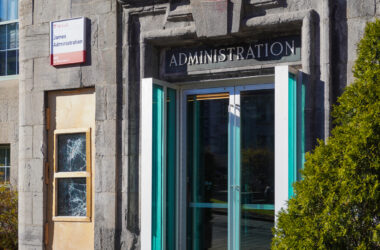Many McGill students have their fair share of issues with WebCT, but it looks as though they might become a thing of the past. By May of next year, McGill is planning to have replaced WebCT with a new learning management system, or LMS.
The movement to replace the Blackboard Learning system entered its early stages in 2009 as the Moving Forward Project Team began to prepare for the inevitable technological obsolescence of a system that was once the best online learning system on the market. Laura Winer, a project member and chair of the Consulting Group on Pedagogy, said this is standard practice.
“WebCT was the best, hands down, five years ago,” echoed Andrew Doyle, the Students’ Society representative on the Project Team.
As WebCT’s natural technological life cycle approaches an end, McGill has begun to shop around for a new LMS that will meet its requirements moving forward.
Under Quebec law, a public institution wishing to pay a company in exchange for its services must go through a two stage process. In the first stage, called a “request for information,” (RFI) McGill must compile a list of all of its requirements for a new myCourses platform. Based on this compilation, a group of three or four vendors who meet at least 70 per cent of the requirements will be selected. In the second stage, McGill will submit a request for proposal, or RFP. The vendor offering the best deal will then be selected.
Because the RFP process has a decision-making mechanism built-in, it’s important for McGill to spend a lot of time at the outset making sure the RFI submitted will most accurately reflect its needs. Currently in the first stage, the Project Team has been carefully conducting a user requirement investigation to ensure that the vendor selected can meet the most important of those needs.
The next LMS will need to meet higher-than-ever industry standards and is expected to fill some of WebCT’s holes. According to Sharon Roy, director of Content and Collaboration Solutions and project manager of Moving Forward, the project is focusing on the need for improvement in three areas: greater collaboration tools, open content, and an improved interface that will be more navigable.
To make sure they are covering all their bases, Moving Forward has been holding demonstration days for potential products. For the first half of each one, from 9 a.m. to 1 p.m., students and faculty are invited to assess how each vendor addresses their needs for a learning management system. The next half of the day is geared towards the IT team, who evaluate how easily the system can be implemented and how well it can be integrated with Banner, McGill’s student information system.
“There’s a whole back end system that students and faculty won’t see but that is important,” said Winer. “It is very important that [the product selected will] integrate with student information systems. We need to make sure that it will sustain the kind of use [the McGill community requires] … and that it won’t crash.”
Another important aspect in choosing a new system will be its ability to keep up with natural technological progress. Despite being the height of technology in its day, WebCT cannot support newer versions of Firefox.
This is also an opportunity to make myCourses more attractive and enjoyable for students. Although Doyle says he hasn’t been particularly successful in getting students to the demonstrations, some intriguing features could be on their way. Some possible additions to the LMS experience include chat rooms and whiteboards, tools such as blogs or wikis that allow for multiple authors, a calendar that integrates with third party calendars, and maybe even a grade book that tells you what you need on the final exam to get an A.
“We’re on track,” said Doyle. “But the more voices [involved], the better.” The schedule for demostration days is available online at http://blogs.mcgill.ca/mycourses.








